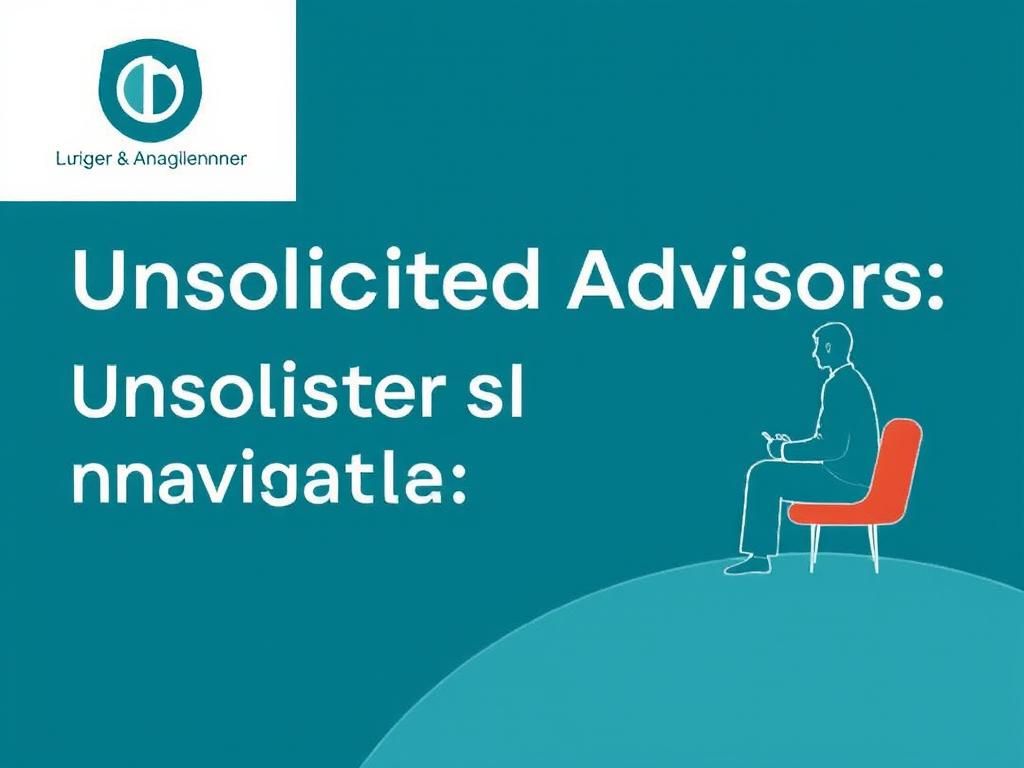Unsolicited advisors are individuals who offer their opinions and suggestions without being asked, often blurring the lines between helpfulness and intrusion. This topic is significant in both business and personal contexts, as unsolicited advice can impact decision-making processes and interpersonal relationships. In this article, we’ll explore the various dimensions of unsolicited advisors, including the psychology behind why people give unsolicited advice, the potential benefits and drawbacks, and effective strategies for managing these advisors.
Understanding Unsolicited Advisors
Who are Unsolicited Advisors?
Unsolicited advisors are individuals—be it friends, family, or acquaintances—who offer advice without solicitation. Their characteristics may include a well-meaning attitude, strong opinions, and a tendency to share personal experiences as a basis for their guidance.
There are different types of unsolicited advisors:
– **Friends**: Often well-meaning, they may share advice based on their experiences or beliefs.
– **Family**: They may feel particularly entitled to give advice based on concern or familial bonds.
– **Professional Connections**: Colleagues or mentors may provide insights, often thinking they are helping, despite the recipient not asking for it.
Common Contexts for Unsolicited Advice
Unsolicited advice arises in various situations, with the most common scenarios being:
– **Personal Life Scenarios**: Decisions regarding relationships, lifestyle choices, or family matters can often attract unsolicited opinions from loved ones.
– **Workplace Situations**: In professional settings, colleagues might offer advice about work-related issues or career paths, even when not requested.
– **Professional Development and Mentorship**: Even within mentorship, unsolicited advice can emerge, particularly when mentors overstep their boundaries.
The Psychology Behind Unsolicited Advice
Motivations for Giving Unsolicited Advice
Understanding why people become unsolicited advisors is essential. Common motivations include:
– **Desire to Help**: Many unsolicited advisors genuinely believe they are contributing positively to another’s life.
– **Personal Experiences and Biases**: Some may project their experiences and biases onto others, thinking their journey is universally applicable.
– **Social Dynamics and Relationships**: Relationships can influence behavior, with some individuals feeling a sense of obligation to share their insights.
Psychological Impact on Recipients
Receiving unsolicited advice can have a range of psychological effects on those targeted:
– **Stress and Anxiety from Unwanted Opinions**: Constant exposure to unsolicited advice can lead to overwhelming feelings of stress or tension.
– **Erosion of Confidence**: Frequent unsolicited input may undermine an individual’s confidence, leading them to second-guess their decisions.
– **Potential for Confusion in Decision-Making**: Mixed messages from various unsolicited advisors could cloud judgment and create uncertainty.

Evaluating the Value of Unsolicited Advice
Criteria for Assessing Advice
When faced with unsolicited advice, it’s crucial to apply certain criteria to assess its potential value:
– **Source Credibility**: Consider whether the advisor has relevant experience or knowledge to offer insightful guidance.
– **Relevance to Current Situation**: Assess if the advice aligns with your unique circumstances.
– **Timing and Context**: Evaluate whether the timing and context of the advice matter in your decision-making process.
Potential Benefits of Unsolicited Advice
Though often unwelcome, unsolicited advice can present certain advantages:
– **Diverse Perspectives and Idea Generation**: Exposure to different viewpoints can foster creativity and innovation in your thinking.
– **Broadening One’s Understanding of Options**: Unsolicited advice may unveil alternatives that you may not have considered.
– **Opportunity for Learning and Growth**: Engaging thoughtfully with unsolicited opinions can facilitate personal and professional growth.
Strategies for Managing Unsolicited Advisors
Setting Boundaries
Strong boundaries are essential for managing unsolicited advisors effectively:
– **Importance of Communication**: Openly communicating your preferences can help set clear expectations with unsolicited advisors.
– **Techniques for Politely Declining Advice**: Phrases such as, “I appreciate your input, but I’m going to take a different approach” can be useful.
– **Creating a Supportive Environment for Discussion**: Encourage discussions that invite solicited advice instead, fostering a culture of support.

Filtering Useful Feedback
Sometimes, unsolicited advice can hold valuable insights:
– **How to Sift through Unsolicited Advice for Nuggets of Wisdom**: Focus on advice that resonates with you individually and discard the rest.
– **Engaging with Constructive Criticism**: Identify constructive criticism that can lead to positive change.
– **Knowing When to Disregard Advice**: Trust your instincts and internal compass when deciding which advice to follow.
When to Seek Professional Advisors
Differences Between Unsolicited and Professional Advice
Understanding the distinction between unsolicited and professional advice is critical:
– **Qualifications and Expertise of Professional Advisors**: Professional advisors often have specialized knowledge or certifications that lend credibility to their counsel.
– **Context of Advice Given (Structured vs. Casual)**: Professional advice typically occurs in a structured environment, providing a clear framework for discussions.
– **Importance of Tailored Solutions vs. General Suggestions**: Unlike unsolicited advice, professional advisors offer guidance that is tailored to your specific needs.
Identifying the Right Type of Advisor
Finding the right advisor can make a significant difference:
– **Characteristics of Effective Advisors**: Look for qualities like empathy, strong communication skills, and a track record of helping others succeed.
– **Evaluating Potential Advisors’ Experience and Track Record**: Conduct thorough research to ensure the advisor possesses the relevant experience.
– **The Role of Personal Fit and Rapport**: A comfortable and trusting relationship enhances the effectiveness of the advice provided.
Conclusion
Navigating the complex landscape of unsolicited advisors requires understanding and strategic action. While unsolicited advice can be disruptive or stress-inducing, it can also serve as an opportunity for growth and diverse perspectives. By recognizing when to engage, how to filter feedback, and when to seek professional guidance, individuals can control their decision-making processes more effectively.
Additional Resources
- Effective Communication
- Workshops and seminars on managing advice and mentorship
- Reference materials on decision-making strategies and self-awareness
FAQ
- What is an unsolicited advisor? An unsolicited advisor is someone who gives advice without being asked, which may come from friends, family, or colleagues.
- Why do people give unsolicited advice? Common motivations include a desire to help, personal experiences, and social dynamics.
- How can unsolicited advice affect me? It can lead to stress, confusion, and erosion of confidence, but it can also provide diverse perspectives.
- What strategies can I use to manage unsolicited advisors? Setting boundaries, filtering feedback, and politely declining advice are effective tactics.
- When should I seek a professional advisor? When you need specific expertise, tailored solutions, or structured guidance distinct from unsolicited advice.
- How do I know which advice to follow? Assess advice based on source credibility, relevance, and the context in which it was given.
- Can unsolicited advice ever be beneficial? Yes, it can provide new perspectives and encourage personal growth if approached wisely.
- What’s the difference between unsolicited and professional advice? Professional advice is often given in a structured context by someone qualified, while unsolicited advice is casual and unrequested.
- How do I politely decline advice? You can express your appreciation while expressing your intent to follow a different path.
- What are the characteristics of effective advisors? Look for advisors who possess empathy, relevant experience, and good communication skills.
| Type of Advisor | Character Traits | Typical Contexts | Potential Impact |
|---|---|---|---|
| Friends | Well-meaning, concerned | Personal life scenarios | Can support but may confuse |
| Family | Obligated, caring | Family matters | Can cause stress or comfort |
| Professional Connections | Knowledgeable, supportive | Workplace situations | May provide useful insights or overwhelm |
| Professional Advisors | Qualified, experienced | Structured guidance | Tailored solutions and clarity |


